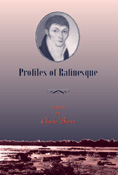Profiles of Rafinesque

- Author(s): Boewe, Charles
- Series:
- Imprint: Univ Tennessee Press
- Publication Date: 2003-06-18
- Status: Active
- Available in Hardcover - Cloth: Price $45.00 | Buy Now
- Leaf eReader required for PDF ebooks
Was the nineteenth-century naturalist C. S. Rafinesque insane? Did he die in “abject poverty?” Just what is the value of his contributions to scientific nomenclature? Charles Boewe’s Profiles of Rafinesque takes up these questions and others. Among early naturalists, C. S. Rafinesque is second only to John James Audubon in the volume of commentary that has been written about him and his works. In contrast to Audubon, however, he has yet to receive an adequate biography. In this volume, Charles Boewe collects the essays of thirteen writers to provide the most comprehensive portrait now available of a persistently controversial character as well as a glimpse into the world of scientific discovery on the early American frontier.
Rafinesque (1783–1840) is best known for his contributions to scientific classification and nomenclature; he gave Latin names to some 6,700 plants in what his critics described as a “complete monomania” for establishing new genera and species. This passion for discovery may not have kept him from following to logical conclusion his own insights such as that of biological variation, which Darwin so famously explicated just a few years later. Rafinesque’s broad interests included the languages of Native Americans and their archaeological remains; these studies contributed to philology and ethnography. He founded a savings bank and marketed a tuberculosis remedy, partially financing his publishing endeavors with his profits. He wrote on subjects ranging from astronomy to zoology, both for professional and for general audiences.
Here are twenty essays, forty-six illustrations, and a summation of 160 years of Rafinesque scholarship, which together reveal a multifaceted individual. Boewe dispels certain myths about Rafinesque’s mental state, the circumstances of his birth and death, and the validity of his scientific work—on these topics Boewe and the other contributors provide a well-rounded picture of an intriguing nineteenth-century American naturalist.
